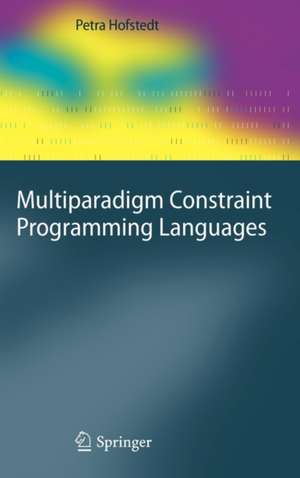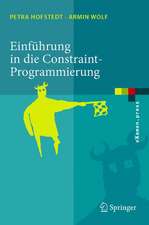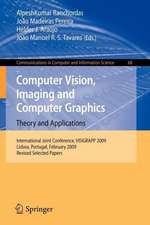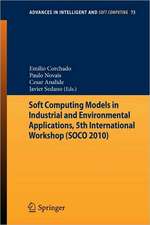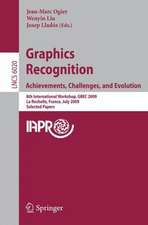Multiparadigm Constraint Programming Languages: Cognitive Technologies
Autor Petra Hofstedten Limba Engleză Hardback – 17 iun 2011
This book deals with the theory and practice of multiparadigm constraint programming languages. The author first elaborates on programming paradigms and languages, constraints, and the merging of programming concepts which yields multiparadigm (constraint) programming languages. In the second part the author inspects two concrete approaches on multiparadigm constraint programming – the concurrent constraint functional language CCFL, which combines the functional and the constraint-based paradigms and allows the description of concurrent processes; and a general framework for multiparadigm constraint programming and its implementation, Meta-S.
The book is appropriate for researchers and graduate students in the areas of programming and artificial intelligence.
| Toate formatele și edițiile | Preț | Express |
|---|---|---|
| Paperback (1) | 586.11 lei 38-44 zile | |
| Springer Berlin, Heidelberg – 3 aug 2013 | 586.11 lei 38-44 zile | |
| Hardback (1) | 645.14 lei 6-8 săpt. | |
| Springer Berlin, Heidelberg – 17 iun 2011 | 645.14 lei 6-8 săpt. |
Din seria Cognitive Technologies
- 20%
 Preț: 350.99 lei
Preț: 350.99 lei - 15%
 Preț: 649.71 lei
Preț: 649.71 lei - 20%
 Preț: 336.21 lei
Preț: 336.21 lei - 15%
 Preț: 635.47 lei
Preț: 635.47 lei - 20%
 Preț: 650.73 lei
Preț: 650.73 lei - 20%
 Preț: 644.15 lei
Preț: 644.15 lei - 20%
 Preț: 886.16 lei
Preț: 886.16 lei - 20%
 Preț: 331.91 lei
Preț: 331.91 lei -
 Preț: 390.63 lei
Preț: 390.63 lei - 20%
 Preț: 337.13 lei
Preț: 337.13 lei - 20%
 Preț: 1458.56 lei
Preț: 1458.56 lei - 20%
 Preț: 646.80 lei
Preț: 646.80 lei - 20%
 Preț: 994.08 lei
Preț: 994.08 lei - 20%
 Preț: 649.09 lei
Preț: 649.09 lei -
 Preț: 397.38 lei
Preț: 397.38 lei - 20%
 Preț: 988.00 lei
Preț: 988.00 lei - 20%
 Preț: 1009.61 lei
Preț: 1009.61 lei - 20%
 Preț: 597.18 lei
Preț: 597.18 lei - 20%
 Preț: 614.19 lei
Preț: 614.19 lei - 20%
 Preț: 675.51 lei
Preț: 675.51 lei - 20%
 Preț: 994.40 lei
Preț: 994.40 lei - 20%
 Preț: 891.89 lei
Preț: 891.89 lei - 20%
 Preț: 600.41 lei
Preț: 600.41 lei - 20%
 Preț: 533.76 lei
Preț: 533.76 lei - 20%
 Preț: 647.61 lei
Preț: 647.61 lei - 20%
 Preț: 512.39 lei
Preț: 512.39 lei - 20%
 Preț: 338.68 lei
Preț: 338.68 lei - 20%
 Preț: 345.22 lei
Preț: 345.22 lei - 20%
 Preț: 668.55 lei
Preț: 668.55 lei -
 Preț: 365.21 lei
Preț: 365.21 lei - 20%
 Preț: 640.51 lei
Preț: 640.51 lei - 20%
 Preț: 1297.17 lei
Preț: 1297.17 lei
Preț: 645.14 lei
Preț vechi: 806.42 lei
-20% Nou
Puncte Express: 968
Preț estimativ în valută:
123.46€ • 134.06$ • 103.71£
123.46€ • 134.06$ • 103.71£
Carte tipărită la comandă
Livrare economică 22 aprilie-06 mai
Preluare comenzi: 021 569.72.76
Specificații
ISBN-13: 9783642173295
ISBN-10: 3642173292
Pagini: 190
Ilustrații: XII, 180 p.
Dimensiuni: 155 x 235 x 15 mm
Greutate: 0.41 kg
Ediția:2011
Editura: Springer Berlin, Heidelberg
Colecția Springer
Seria Cognitive Technologies
Locul publicării:Berlin, Heidelberg, Germany
ISBN-10: 3642173292
Pagini: 190
Ilustrații: XII, 180 p.
Dimensiuni: 155 x 235 x 15 mm
Greutate: 0.41 kg
Ediția:2011
Editura: Springer Berlin, Heidelberg
Colecția Springer
Seria Cognitive Technologies
Locul publicării:Berlin, Heidelberg, Germany
Public țintă
ResearchCuprins
Basic Notions.- Programming Languages and Paradigms.- Constraints.- Multiparadigm Constraint Programming Languages.- Concurrent Constraint Functional Programming with CCFL.- A Generic Framework for Multiparadigm Constraint Programming.- Outlook.- References.- Index.
Recenzii
From the reviews:
“The book describes elementary and advanced constraint programming concepts. … This book is a useful textbook for related courses at the undergraduate or graduate level, but requires a background in general programming concepts, mathematical logic, and programming language theory. … The book would also be a good starting reference for researchers studying constraints.” (Maulik A. Dave, ACM Computing Reviews, July, 2012)
“The book describes elementary and advanced constraint programming concepts. … This book is a useful textbook for related courses at the undergraduate or graduate level, but requires a background in general programming concepts, mathematical logic, and programming language theory. … The book would also be a good starting reference for researchers studying constraints.” (Maulik A. Dave, ACM Computing Reviews, July, 2012)
Notă biografică
The author holds the Chair for Programming Languages and Compilers at the Brandenburgische Technische Universität (btu) Cottbus.
Textul de pe ultima copertă
Programming languages are often classified according to their paradigms, e.g. imperative, functional, logic, constraint-based, object-oriented, or aspect-oriented. A paradigm characterizes the style, concepts, and methods of the language for describing situations and processes and for solving problems, and each paradigm serves best for programming in particular application areas. Real-world problems, however, are often best implemented by a combination of concepts from different paradigms, because they comprise aspects from several realms, and this combination is more comfortably realized using multiparadigm programming languages.
This book deals with the theory and practice of multiparadigm constraint programming languages. The author first elaborates on programming paradigms and languages, constraints, and the merging of programming concepts which yields multiparadigm (constraint) programming languages. In the second part the author inspects two concrete approaches on multiparadigm constraint programming – the concurrent constraint functional language CCFL, which combines the functional and the constraint-based paradigms and allows the description of concurrent processes; and a general framework for multiparadigm constraint programming and its implementation, Meta-S.
The book is appropriate for researchers and graduate students in the areas of programming and artificial intelligence.
This book deals with the theory and practice of multiparadigm constraint programming languages. The author first elaborates on programming paradigms and languages, constraints, and the merging of programming concepts which yields multiparadigm (constraint) programming languages. In the second part the author inspects two concrete approaches on multiparadigm constraint programming – the concurrent constraint functional language CCFL, which combines the functional and the constraint-based paradigms and allows the description of concurrent processes; and a general framework for multiparadigm constraint programming and its implementation, Meta-S.
The book is appropriate for researchers and graduate students in the areas of programming and artificial intelligence.
Caracteristici
Suitable for researchers and graduate students working in the areas of programming and constraints Introduces new approaches Demonstrates results on real-world problems Includes supplementary material: sn.pub/extras
